#danish language
Note
What’s the deal with the Danish language?
I was looking up why you'd need a language to ask for like a Cheese Danish and apparently there is an actual "Danish" language spoken by people in an entire country called Danmark, or "Denmark" if you're not really from there. The country has millions of people, also called the Danish, use money called Danish Krones, and the whole region is basically shaped to be Germany's antlers.
The stuff I learn for this blog is wild.
348 notes
·
View notes
Photo
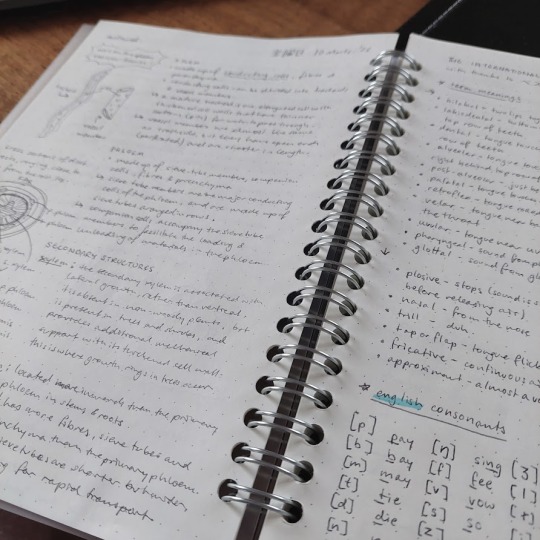


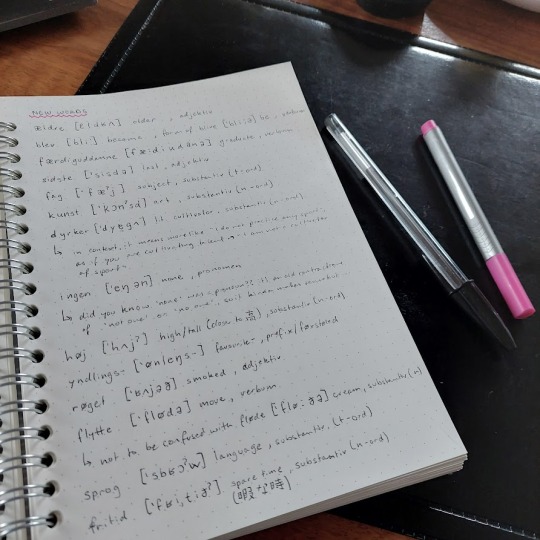
lørdag, 18 marts 2023
studying phonetic writing for danish and exploring københavn!
min dansk er stadig ikke så god, men det er ved at blive lidt bedre
#danish language#dansk sprog#denmark#studyblr#study aesthetic#student#pretty notes#I'm also self studying botany in that first pic#I miss japanese
783 notes
·
View notes
Text
9 number things you might not know as a foreign speaker of Danish
This is a mishmash of both cultural things and linguistic things. The idea for this post appeared in my head at 3 am so bear with me. As for the lack of links, I am adding them in a reblog to try to avoid tumblr nerfing my post.
1) Quarters – how to measure time
In Denmark, we love measuring time in quarters of an hour. We love it so much we don't care about specifying the kind of quarter, it's just kvarter (itk.). Generally, we tend to use kvarter mostly just when speaking about 15 or 45 minutes, but it does go further than that. So here's a quick guide on how to tell time other than just doing as you would in English:
15 minutes – et kvarter
30 minutes – en halv time
45 minutes – tre kvarter
75 minutes/1h 15m – en time og et kvarter · fem kvarter
90 minutes/1h 30m – halvanden time (see 2)
105 minutes/1h 45m – en time og tre kvarter
and so forth, if you care to. Using fem kvarter is uncommon but acceptable, but never go further than that using just quarters of an hour. I would say that once you pass 2 hrs, I most commonly hear people starting to just count hours and minutes as you would in English.
2) Halvanden – half second
An archaic way of saying 'one and a half' that just stuck for some reason. This is the preferred way to say 'one and a half ' for most people. No, this is not a joke.
Halvanden, 'half second' means halfway between one and two. Until quite recently (we're talking less than a century) halvtredje (2.5), halvfjerde (3.5), etc. were also in common use, but they have disappeared so rapidly that most current speakers will have absolutely no idea what the hell you're talking about. However, the ghosts of this way of counting live on in the numbers halvtreds (50), halvfjerds (70), and halvfems (90). You can read more about that in my old post about Danish numbers (see reblogs).
3) Week 42
We use week numbers! Week 1 is the first week in the new year to contain a Thursday, as we count weeks as Monday through Sunday. You don't necessarily need to know what week it is all the time, but a lot of adults use weeks in place of specific dates. I am forever thankful to ugenr.dk (you just type in a date and it tells you what week it is in or vice versa).
Important weeks are:
Week 7/8 – winter break for kids in primary and secondary school (not to be confused with Christmas break). It varies depending on municipality whether it's week 7 or 8. Lots of people go skiing these weeks.
Week 26 through 31 – summer break is usually during these weeks. All students in primary and secondary school, as well as university students and students doing professional bachelor's degrees and the like have these weeks off from school.
Week 42 – arguably the most important week. All students mentioned above have this week off from school. It's autumn break and it's ALWAYS week 42 and JUST week 42. Originally, it was to allow students in rural areas help their parents harvest potatoes (a nickname for autumn break is kartoffelferien 'the potato break'), and we just kept it.
4) DD-MM-(YY)YY
If you write dates as MM-DD people will think you're a lunatic. Don't, unless you're specifically talking about 9/11, colloquially referred to as just 9/11 (nine-eleven, as you would say it in English).
5) 00:00
Denmark, like a lot of other European countries, uses 24hr clocks. Obviously, analogue clocks and watches are common, and it's perfectly ok to say stuff like klokken fire om eftermiddagen 'four o'clock in the afternoon' or klokken otte om aftenen 'eight o'clock in the evening', but you are expected to just know that 21:00 is the same as 9 PM. You can also say klokken toogtyve 'twenty-two o'clock', and it's quite normal to ask for clarification of whether people are talking AM or PM by saying stuff like klokken elleve eller klokken treogtyve? 'eleven o'clock or twenty-three o'clock?'. You cannot use AM and PM when speaking or writing Danish. The day begins at midnight; 00:00.
Don't worry yourself too much over this. Everyone occasionally forgets that 19:00 is in fact 7 o'clock and not 9 o'clock.
6) Halv to – half one
When you're measuring half hours in Danish, you're always measuring towards the next whole number. It's never half past, it's always half to. As such, half (past) one is halv to 'half two' in Danish.
7) Grades (years)
This is an ultra quick rundown of the Danish school system. School is mandatory for 10 years and homeschooling is allowed. This covers primary and lower secondary school.
Most people start school the year they turn 6. My birthday is in April, so I was 6 when I stated school, my sister's birthday is in September, so she was 5.
The mandatory grades are as follows. The ages are all possibly ages of a child attending that grade (not accounting for starting school early or late):
Indskolingen, grades 0-3
0. klasse/børnehaveklasse - 5-7 yo
1. klasse – 6-8 yo
2. klasse – 7-9 yo
3. klasse – 8-10 yo
Mellemtrinnet, grades 4-6
4. klasse – 9-11 yo
5. klasse – 10-12 yo
6. klasse – 11-13 yo
Overbygningen/udskolingen, grades 7-9
7. klasse – 12-14 yo
8. klasse - 13-15 yo
9. klasse - 14-16 yo
Some may choose to do 10. klasse, if they feel like they need more schooling or maybe if they're attending an efterskole.
Once they've finished their mandatory schooling, a lot of Danes choose to attend upper secondary school. You can do it in 3 years (stx, hhx, htx, and eux) or 2 years (hf, 2-årigt studenterkursus). Special circumstances like being an elite level athlete or attending MGK (preparation for attending a music conservatoire) may lead to people spending 4 years in upper secondary. Hf often sees a lot of adult students.
Gymnasium/HF, the grades are said as [ordinal number, letter(s)]
1.g (15-17 yo)/1.hf
2.g (16-18 yo)/2.hf
3.g (17-19 yo)
8) Grades (performance)
Danish schools have a 7-grade system. It's called 7-trinskalaen, and each grade corresponds to an ECTS grade (in fact, it's specifically designed for compatibility, and a lot of people above the age of 30 miss the old scale). Generally, students don't get grades until 7th grade. The grades are:
12 – A
10 – B
7 – C
4 – D
02 – E
00 – Fx
-3 – F
If you are not familiar with the ECTS system, E, Danish 02, is the lowest passing grade. The intention behind the 0's in 02 and 00 is to make it impossible for the students to "change" their grade by just adding 1 in front of the grade, but the 0's are in fact also said out loud.
9) Ordinal numbers
Ordinal numbers are written as a number followed by a full stop. You do not capitalise the first letter of any word following the full stop (see 7) even though MS Word will try to convince you it's the right thing to do.
You can read a lot more about numbers on the Danish numbers post (again, in a reblog), but the basics that might not be covered by formal learning materials are:
nulte zeroth. This literally only exists for 0. klasse and for numbers to the zeroth power.
fyrretyvende/fyrrende* – fortieth
halvtredsindstyvende/halvtredsende* – fiftieth
tresindstyvende/tressende* – sixtieth
halvfjerdsindstyvende/halvfjerdsende* – seventieth
firsindstyvende/firsende* – eightieth
halvfemsindstyvende/halvfemsende* – ninetieth
The forms marked with an asterisk are largely informal spoken language to the degree that they are even considered wrong by some. Generally, they are accepted as the standard forms among the younger generations, but be careful when talking to people above the age of ~45.
#original#danish#danish language#danish langblr#langblr#tongueblr#danish numbers#school#time#dates#numbers#uhhh i think thats it
56 notes
·
View notes
Text





#lana del rey#girlblog#girlblogging#hell is a teenage girl#games of thrones#jamie lannister#nikolaj coster waldau#ideal man#i love it#love him#danish language#vogue scandinavia#stockholm streetstyle#ultraviolence#lust for life#cinnamon girl#vanilla aesthetic
42 notes
·
View notes
Note
What's the language (con or nat) that frustrates you the most? I can't seem to shake my disdain for French
German der/die/das drives me nuts, but I can't help but love that language! I feel like I'm randomly throwing -e, -er, -en, -n, and -es onto adjectives, but it's so much fun. I'm like that kid playing the PVP version of Splatoon 2 who's just like, "I'M SQUIRTING PAAAAAAAINT!" while everyone else is trying to win, and somehow, randomly, I every so often end up covering a really big space and taking out two enemy combatants, and my teammates look at me and are all like, "Does he actually know how to play this...?", but then I come out with something like, "Und jetzt werden wir in dem Park einen Pferdreit nehmen!" and they're all like, "Nah..."
The only language I can't seem to pronounce is Dutch and its unfathomably opaque diphthongs. It's like you ask, "What color is this?"
COLOR
And they're all like, "Blurplet".
...
"Purple?"
"Ha, ha! Close to that, but it's more Vioblur."
...
"Violet...?"
"HA, HA, HA, HA!!! Oh my god, that's so cute! No, this is violet!"
COLOR
...
"Uhhhhhhhh...isn't that the exact same color...?"
And they're immediately:

I've never met a language where the vowels were so definitive and opaque. At least with Danish you can just take whatever you're saying and say it at x10 speed and they're all like, "Wow, you speak so slowly and clearly! It's so quaint!"
But, yeah... I love all the languages. I want to learn them all. What a joy that would be, to have time to learn them all... To take classes in every language... Oh, how I'd love that!
Anyway, thanks for the ask!
123 notes
·
View notes
Text
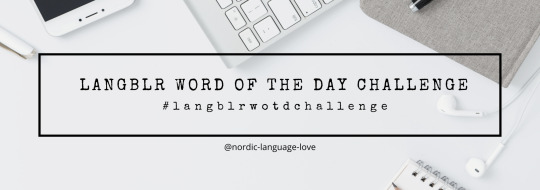
(My) Langblr Word of the Day Challenge!
While I was browsing language challenges to motivate myself and keep learning this August, I found @nordic-language-love's lovely Word of the Day Challenge, and I thought I'd give it a shot!
I'm participating for Russian, Sardinian, and Danish. As I still have low proficiency (~A1/A2) in all of these languages, I chose to only try my hand at the following prompts:
Translate the word into your target language
Find a synonym and/or an antonym for the word
Write a paragraph (or more) based around the word / one sentence containing the word
Learn 5 words related to the word /create a vocab list based around the word
I'll start by making 3 posts a day – one for each language – and see if it's sustainable. If you feel like participating and are learning one of these languages (or Italian – I'm a native speaker so I could offer some help!) please feel free to tag me!!
#langblrwotdchallenge#Langblr Word of the Day Challenge#Langblr#sardinian language#sardinian langblr#russian langblr#russian language#danish language#danish langblr#studyblr#study blog#uni student#uniblr
13 notes
·
View notes
Photo
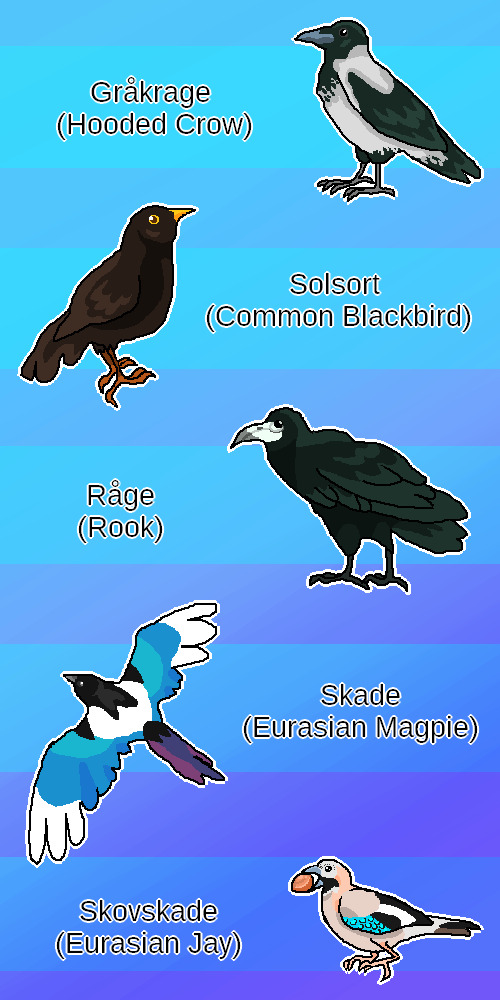
🐦 Fugle fra Danmark (Birds from Denmark)
Gråkrage (Hooded Crow)
Solsort (Common Blackbird)
Råge (Rook)
Skade (Eurasian Magpie)
Skovskade (Eurasian Jay)
#min kunst#art#learning danish#danish langblr#danish language#danish#dansk#fugl#bird#languageblr#langblr
38 notes
·
View notes
Text
Fun thing I've noticed about the Danish language: When it comes to rhymes, it matters more if there's a stød (glottal stop) or not, than whether the vowel sound is the same. This song has great examples of both:
youtube
At 3:25 we get the lyrics
Da måtte man høre så langt af led
Thus they heard far far away
Hvor nøkken han under vandet græd
How nøkken cried beneath the water
I've highlighted the different rhymes in matching colors.
The thing is, led (direction/place/way) and græd (cried) do not have the same vowel sounds. Led has a near-close near-front unrounded vowel, with the phoneme /e/, while græd has something more akin to (though not quite like) an open central unrounded vowel, with the phoneme /ɑ̈ː/. But because both vowels lack a stød/glottal stop, and because they're quite close to each other anyways, it registers to the listener as a rhyme.
Compare with the lyrics at 1:33
Og jomfruen smiler under skind
And the maiden smiles unseen
Åh, gid den ridder han var min
Oh, if only that knight would be mine
Skind has a vowel sound almost identical to the one in led, while min has a close front unrounded vowel, with the phoneme /i/. However, there's a glottal stop in min, which is probably inaudible to non-Danish-speakers, but is glaring to Danish-speakers. Because of the glottal stop, led and græd is a better rhyme than skind and min, despite /e/ being closer to /i/ than it is to /ɑ̈ː/.
2 notes
·
View notes
Text

Efterårsvokabular: Ord om efteråret
Navneord (nouns):
🌳 kastanjetræ [sb.] - chestnut tree
-et, -er, -erne
🌿 brombærbusk [sb.] - blackberry bush
-en, -e, -ene
🌧 regnvejr [sb.] - rainy weather / rainfall
-et
🎃 græskar [sb.] - pumpkin
-et, -ene
🍂 blad [sb.] - leaf
-et, -e, -ene
🤧 forkølelse [sb.] - a cold
-n, -r, -rne
🧹 kost [sb.] - broom
-en, -e, -ene
🍄 svamp [sb.] - mushroom
-en, -e, -ene
🥶 kulde [sb.] - cold
-n
🌬 blæsevejr [sb.] - windy weather
-et
☂️ paraply [sb.] - umbrella
-en, -er, -erne
Farver (colours):
❤️ rød [adj.] - red
-t, -e || -ere, -est
💛 gul [adj.] - yellow
-t, -e || -ere, (-est)
🧡 gulerodsfarvet [adj.] - carrot coloured / orange
…farvede
🤎 jordfarvet [adj.] - earth coloured / brown
…farvede
👑 gylden [adj.] - golden
-t, gyldne
#danish language#danish word#danish#danish langblr#learning danish#living danishly#danish words#language learning#adjective#noun#language#vocab list#autumn#autumn vocab list#colours
31 notes
·
View notes
Text
Jeg lærer dansk (deraf det dansk lol) og ‘tak’ er så sjovt at sige. Jeg vil tale med min kat og sige “tak tak tak taktaktaktak” hahdhd
I am learning danish (hence the danish lol) and ‘thank you’ is so fun to say. I will talk to my cat and say “ty ty ty tytytyty” hahdhd
#if any native dansk speakers wanna slide into my dms and talk to me#thatd be cool#or just other learners#danish langblr#danish language#langblr#dansk posting
13 notes
·
View notes
Photo
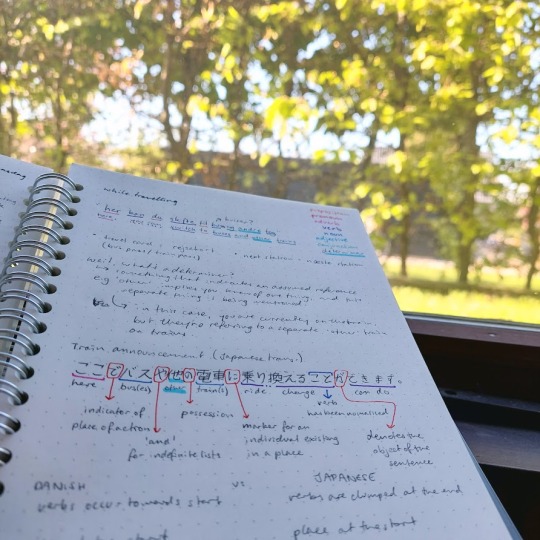
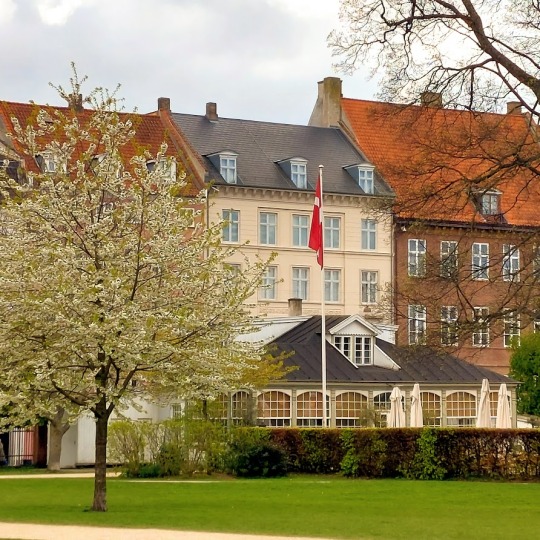


onsdag, 10 maj 2023
enjoying the spring weather while comparing danish and japanese grammar structures :D
#studyblr#danish language#japanese language#student#study aesthetic#denmark#pretty notes#I swear the only danish I know is trains and food related
55 notes
·
View notes
Text
Top ten Danish sayings according to me
My ten favourite Danish sayings/turns of phrase (in no particular order), just because I love language. I say all of these regularly. Enjoy!
goddag mand, økseskaft – hello man, axe handle
This one is used when someone answers a question you asked in a nonsensical way or just in general when someone has said something foolish or nonsensical. you can read about the origin in Danish here.
det kan ske, det kniver med gaflerne – it may spoon it knives with the forks / it happens that the forks are in short supply
Not used in any specific situation other than when someone says det kan ske 'it happens', because ske 'spoon' and ske 'happen' just so happen to be homonyms. Additionally kniv 'knife' and knibe 'be in short supply' are almost homophonous, especially if kniv was a verb.
fra folk og fulde børn skal man høre sandheden – from people and drunk children you will hear the truth
This is not actually the saying, it's supposed to be børn og fulde folk, but it's more fun like this. Originally, this refers to the fact that neither children, nor the drunk tend to think too hard before speaking, thus they tend to tell the truth.
det haster ikke mere end det jager – it's no more urgent than urgency
Excuse my creative liberties here, as both haste and jage mean 'be urgent'. It is more or less synonymous with "take it easy, no rush" – a sort of Danish hakuna matata.
To me, as someone from Western Jutland, jager should always be pronounced jawer ['ja.wʌ] in this saying.
stå med håret i postkassen – to have gotten one's hair stuck inside the mailbox
A metaphor for when you are in some sort of trouble or problematic situation where you feel like you have no power to change your unlucky situation. Often used when you are disappointed as a result of being cheated somehow.
det kan noget – it does something
My best approximation of an English version is "it's got a certain je ne sais quois", because that's literally what it means. It does something for you, specifically, but you're not entirely sure what exactly it is that it does – but it works!
man kan æggehvide, hvad man æggeskal – one egg whites what one eggshells | one cannot know what one should not do
Another pun, I am sorry for being your literal dad, I guess. Basically æggehvide 'egg white' sounds like ikke vide 'not know' and æggeskal 'eggshell' sounds like ikke skal 'should not'
ikke nå nogen/noget til sokkeholderne – not being able to reach someone/something's garters
When someone/-thing is not nearly as good as someone/-thing else. You know, it barely reaches above their knee!
hvor der handles, der spildes – where stuff gets done, stuff gets lost
Exactly what it says on the tin. Its English cousin is "you can't make an omelet without breaking a few eggs".
fanden og hans pumpestok – the Devil and his pump stick
Yes, this is as vulgar as it sounds. This one is used last in lists of things that are excessive, e.g, vi skulle støvsuge, slå græs, fjerne spindelvæv, dampe gulvtæppet og Fanden og hans pumpestok 'we had to vacuum, mow the lawn, remove cobwebs, steam the carpet and God knows what else'.
Honourable mention for this one that I learnt while looking stuff up in the dictionary:

[ID: A screenshot from Danish online dictionary ordnet.dk of the entry for the saying 'anbringe bagdelen i klaskehøjde'. It explains the saying and additionally recommends the entries for smæk and øretævernes holdeplads. End ID]
Translation:
to place one's backside (ass, bum) in smacking height.
TRANSFERRED MEANING cause oneself to end up in a situation where one might very easily be exposed to criticism and negative reactions from one's surroundings – e.g., by speaking openly about a certain case USE informal
SEE ALSO spanking | the whoopings' parking space
#literally googled 'euphemisms for getting beat up' to find a translation of øretæver that i liked#the literal translation is ear beatings#but its about ~the vibes~ as is the trend for translations#anyway heres a post!!!#danish#danish language#langblr#Danish langblr#language#idioms#sayings#vocabulary#original
107 notes
·
View notes
Text

A cartoon map of Denmark, a tiny country with a LOT going on!
If you've been to Denmark or hail from this country, how many places have you been to / where is your hometown?
Source: I Love my Danish Heritage Facebook page
#maps#funny#cartoon#denmark#danish language#europe#scandinavian style#nordic countries#travel#heritage#geography
4 notes
·
View notes
Text
Small server my friend made; feel free to join! We're all at beginner level so far, so don't worry if you're not very far into learning your language!
So far there are channels for ASL, Danish, Japanese, Russian, and Spanish, and we're happy to add more. We're also discussing doing some regular meetings for people to practice conversations or read simple books together in the voice chat channels.
#language learning#language#langblr#languages#american sign language#danish language#japanese language#russian language#spanish language
18 notes
·
View notes
Text

Duolingo is cursed ☠️
3 notes
·
View notes
Text
Langblr Word of the Day Challenge

Day 1: Rain
DANISH: regn 💧
Create a vocab list of at least 5 words based around the word
storm — storm ⛈️
syndflod — deluge 🌧️
støvregn — drizzle 🌦️
hagl — hail 🌨️
sne — snow ❄️
sky — cloud ☁️
torden — thunder 🌩️
lyn — lightning ⚡
himmel — sky 🌌
- overskyet — cloudy / overcast 🌫️
regnbue — rainbow 🌈
paraply — umbrella ☂️
Write a paragraph (or more) based around the word / one sentence containing the word
Jeg så regn uden for vinduet og jeg tog paraplyen.
#Langblr Word of the Day Challenge#langblrwotdchallenge#danish langblr#danish language#denmark#studyblr#study blog#uniblr#uni student
9 notes
·
View notes